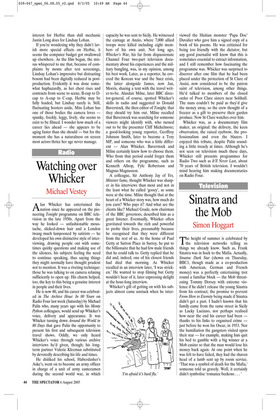Watching over Whicker
Michael Vestey
Alan Whicker has entertained the nation since he appeared on the pioneering Tonight programme on BBC television in the late 1950s. Apart from the way he looked — unfashionable moustache, slicked-down hair and a London twang much lampooned by satirists — he developed his own distinctive style of interviewing, drawing people out with sometimes quirky questions and making use of the silences, his subjects feeling the need to continue speaking, thus saying things they might normally have thought prudent not to mention. It was a riveting technique: those he was talking to on camera relaxing sufficiently to open up. His charm helped, too, the key to this being a genuine interest in people and their lives.
He is now 80, and his career was celebrated in The Archive Hour: In 80 Years on Radio Four last week (Saturday) by Michael Palin who, many years ago with his Monty Python colleagues, would send up Whicker’s voice, delivery and appearance. It was Whicker turning down Around the World in 80 Days that gave Palin the opportunity to present his first and subsequent television travel shows. Oddly, we only heard Whicker’s voice through various archive interviews he’d given, though; his longterm partner Valerie Kleeman substituted by devotedly describing his life and times.
He disliked his school, Haberdasher’s Aske’s, went on to become an army officer in charge of a unit of army cameramen during the second world war, in which capacity he was sent to Sicily. He witnessed the carnage at Anzio, where 7,000 allied troops were killed including eight members of his own unit. Not long ago, Whicker’s War, his far from dispassionate Channel Four two-part television documentary about his experiences and the military bungling, was, in my opinion, among his best work. Later, as a reporter, he covered the Korean war and the Suez crisis, the latter alongside James, now Jan, Morris, sharing a tent with the travel writer-to-be. Alasdair Milne, later BBC director-general, of course, spotted Whicker’s skills in radio and suggested to Donald Baverstock, the then editor of Tonight, that they should try him out. Milne recalled that Baverstock was searching for someone viewers might identify with, who turned out to be the presenter Cliff Michelmore; a good-looking young reporter, Geoffrey Johnson Smith, later to become a Tory MP, and someone who was a little different — Alan Whicker. Baverstock and Milne certainly knew how to choose them. Who from that period could forget them and others on the programme, such as Kenneth Allsop, Fyfe Robertson and Magnus Magnusson.
A colleague, Sir Anthony Jay of Yes, Minister fame, thought Whicker was sharper in his interviews than most and not in the least what he called ‘gooey’, as some were at the time. Milne thought that at the heart of a Whicker story was, how much do you earn? Who pays it? And what are the clients like? Michael Grade, now chairman of the BBC governors, described him as a great listener. Eventually, Whicker often gravitated towards the rich and powerful to probe their lives, presumably because he recognised that they were different from the rest of us. At the home of Paul Getty at Sutton Place in Surrey, he put to the billionaire that he had few male friends that he could talk to. Getty replied that he did and, indeed, one of his closest friends had died that morning. As Whicker recalled in an interview later, ‘I was stricken.’ He wanted to stop filming but Getty wouldn’t hear of it, later expressing delight at the hour-long interview.
Whicker’s gift of getting on with his subjects almost came unstuck when he inter viewed the Haitian monster ‘Papa Doc’ Duvalier who gave him a signed copy of a book of his poems. He was criticised for being too friendly with the dictator, but any good journalist will know that this is sometimes essential to extract information, and I still remember how fascinating the programme was. Whicker was surprised to discover after one film that he had been placed under the protection of St Clare of Assisi, now considered to be the patron saint of television, among other things. He’d talked to members of the closed order of Poor Clare sisters near Solihull. The nuns couldn’t be paid as they’d give the money away, so the crew thought of a freezer as a gift to preserve their garden produce. Now St Clare watches over him.
Whicker was, as a documentary film maker, an original: the delivery, the keen observation, the raised eyebrow, the professionalism and even the blazers. I enjoyed this tribute, despite Palin sounding a little treacly at times. Although he’s not seen on television much these days, Whicker still presents programmes for Radio Two such as It’ll Never Last, about 70 years of British television. I wouldn’t mind hearing him making documentaries on Radio Four.











































 Previous page
Previous page